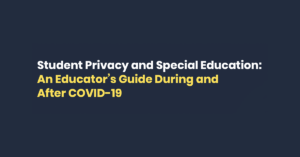Student Privacy, Special Education, and Online Learning: Navigating COVID-19 and Beyond
COVID-19 continues to disrupt education and has forced many schools to pivot to virtual, or online, learning for the fall semester. And virtual learning poses unique student privacy challenges, particularly for students with disabilities, such as:
Can a student’s family members and parents be present during a live virtual class?
Can a class be recorded for a student to view later?
Can a student receive one-on-one services or teletherapy via video conferencing?
How do you know if a video conferencing platform is safe to use?
To help educators navigate some of these common challenges and concerns, the Future of Privacy Forum (FPF) and the National Center for Learning Disabilities (NCLD) partnered to develop a new resource, Student Privacy and Special Education: An Educator’s Guide During and After COVID-19. The Educator’s Guide covers how federal laws including the Family Educational Rights and Privacy Act (FERPA), Individuals with Disabilities Education Act (IDEA), Children’s Online Privacy and Protection Act (COPPA), and Health Insurance Portability and Accountability Act (HIPAA) apply to virtual learning.
To help address a common source of frustration and confusion for many educators, students, and their families, the Educator’s Guide outlines best practices for educators around the use of video classrooms, including:
- Setting meeting preferences, so attendees do not automatically share their video when joining the call.
- Not requiring students to have their video turned on during classes.
- Letting parents know about live virtual classes ahead of time so they can decide whether they want their student to join by video.
- Taking precautions when storing or sharing the video when recording a lesson that will include students’ names or appearance, and ensuring that the recording remains protected and accessible only to those who are allowed to access to students’ records under FERPA.
As part of their reopening plans, many schools plan on collecting new levels of sensitive health information from staff, students, and their families to assess and mitigate health risks. This information will be collected in a variety of manners, including self-reported surveys or screenings such as temperature checks. Students with disabilities or special health care considerations that may be more vulnerable to COVID-19 may be at risk of discrimination based on their health or disability status. For more insight on the student privacy implications of this data collection, read FPF’s issue brief on this topic here. Educators seeking further support may be interested in FPF’s new series of “Student Privacy and Pandemics” professional development training for educators, which includes a module focused on video classrooms. FPF is also developing an ongoing series of issue briefs on the student privacy implications of various reopening strategies schools are considering, including the uses of temperature checks and thermal scans, as well as wearable technologies, to help identify potential COVID-19 cases.



